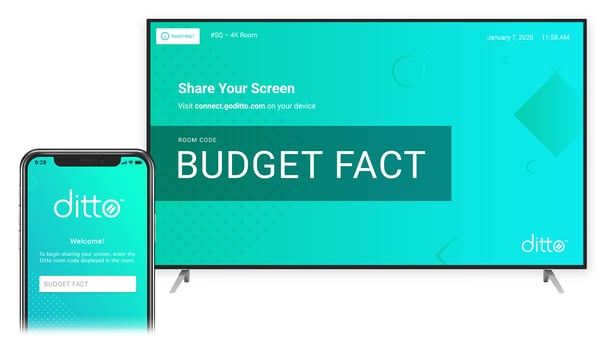
- Information
- Markets
- Pricing
-
Features
- Screen Mirroring
- Digital Signage
Ditto vs. Kramer VIA GO
Which is Better for Screen Mirroring?

Which is Better for Screen Mirroring?
Compare Ditto and Kramer VIA GO. This article breaks down each wireless presentation solution so you can make the best choice for your organization.
To skip all the reading and talk to someone directly, allow us to introduce ourselves.
Looking for a comparison of the recently released Kramer VIA GO2? Read it here.
Ditto is a screen mirroring software solution. It runs on existing receiver hardware connected to a TV or other primary display. Ditto receivers are hardware devices such as Apple TVs and Windows computers. Users connect to each receiver and share their screens using an app on their devices.
Kramer VIA GO is a wireless hardware screen mirroring solution. A proprietary hardware box is connected to a TV or other display. Users download an app to share their device screens to the primary display in the room.
Want to see what's under the hood? Get detailed tech specs on Ditto and Kramer VIA GO right here.
Ditto supports devices running Windows, macOS, iOS, iPadOS, Android and Chrome OS. These devices use the Ditto Connect app to share content and screen mirror wirelessly to numerous compatible Ditto receivers. The user experience is consistent across all devices.
Kramer VIA GO supports Windows, macOS, iOS, iPadOS, Android and Chrome OS devices. Devices connect to a Kramer VIA GO with an app. Some devices have native screen mirroring capability.
Ditto: |
Kramer VIA GO: |
| ✔ Windows | ✔ Windows |
| ✔ macOS | ✔ macOS |
| ✔ iOS | ✔ iOS |
| ✔ iPadOS | ✔ iPadOS |
| ✔ Android | ✔ Android |
| ✔ Chrome OS | ✔ Chrome OS |
Users connect and present with Ditto and Kramer VIA GO in different ways.
The TV or primary display shows a room code. Users enter the room code into the Ditto Connect app on their device, and their device connects to the display instantly.
Desktop users can connect via a web browser if they don’t want to download an app.

There are a couple ways to share content with Kramer VIA GO, depending on a user’s device.
Use the Kramer VIA GO app
Users must first connect to the Kramer VIA GO’s broadcasted wifi network.
Upon first connection, desktop users must locate and enter the receiver’s IP address into their browser. Users must click an option to either load a file downloaded from their browser to access the Kramer VIA GO app or to permanently install it for later use.
To begin mirroring, desktop users open the app, enter the receiver’s IP address, enter a username, click log in, type in a four-digit room code and click log in again.
Android, iOS and Chrome OS users must download the app onto their devices from their respective app stores. Once the app is opened, they must locate and enter the receiver’s IP address, type in a username, click log in and then enter a four-digit room code to begin mirroring.
Use native AirPlay screen mirroring (Apple devices only)
After connecting to a Kramer VIA GO receiver’s broadcasted wifi network, users with Apple devices can use native screen mirroring via AirPlay. This will require numerous ports to be open on your network.
AirPlay mirroring is only available for one device at a time.
Both Ditto and Kramer VIA GO allow an unlimited number of users.
Ditto supports mirroring multiple devices simultaneously to the big screen. Up to four users can connect and screen mirror at once. Kramer VIA GO allows two devices to be displayed on screen at the same time, but does not support multiple AirPlay connections.
Display branding and connection information: Ditto allows each receiver to be styled with company branding in addition to displaying connection instructions on screen. Ditto account admins can upload logos, background images and banners to brand every display and Ditto Connect app with organization-specific visuals.
Kramer VIA GO displays connection instructions by default. Admins can add a static wallpaper image to the display. The receiver must be rebooted after changing the wallpaper settings.
Calendar integration: Admins can integrate a Google or Microsoft Outlook calendar with each Kramer VIA GO receiver. The receiver will display the room’s availability on its home screen.
Do Not Disturb: When activated, this feature prevents connections from others while a user is mirroring their screen with Kramer VIA GO.
Mirroring options: Kramer VIA GO users can only mirror full device screens or stream content like documents and media files. Ditto users can share specific windows, apps and full device screens.
Both Ditto and Kramer VIA GO offer administration capabilities. Ditto administration and remote management takes place entirely within the Ditto Account Portal — a web-based application accessible from anywhere. It is included with a Ditto subscription.
The Kramer VIA GO and other Kramer products can be managed from a central platform called VIA Site Management. VIA Site Management software is licensed and purchased separately from each Kramer device (See “Price breakdown” below). Your organization must be using Windows Server to run the software. If you don’t purchase VIA Site Management licenses, each Kramer VIA GO receiver must be updated manually.
Both Ditto and Kramer VIA GO require receivers deployed in each room they’re used in.
Mounting brackets and additional hardware accessories are available for the Kramer VIA GO for an additional cost. Mounting a Kramer VIA GO requires drilling into a wall or other surface.
Kramer VIA GO receivers are assigned a default IP address out of the box. Kramer highly recommends changing the IP address for every receiver to suit your organization’s network as part of the deployment process. This requires logging in to each Kramer VIA GO receiver with an administrator password, editing the IP address and other LAN settings and rebooting each receiver.
Editing any wireless or network settings on Kramer VIA GO requires a wait period for the new changes to load plus additional time to reboot the receiver each time a change is made.
Ditto and Kramer VIA GO both offer digital signage capabilities, allowing admins to display content on screens when users are not actively mirroring. Features, price points and offerings vary between both platforms.
Ditto offers an all-in-one platform for designing, managing and scheduling signage. Ditto digital signage is a robust service included at no extra cost with every subscription.
Learn more about Ditto digital signage.
The Kramer VIA GO displays content such as scrolling text, RSS feeds and media using its licensed VIA digital signage product. Other options are available with external vendors using additional paid subscription plans.
Kramer pushes users to integrate third-party digital signage vendor Zignage, which adds recurring fees. Service, uptime and features are reliant on Zignage and not managed by Kramer. If your Kramer VIA GO receiver was purchased before June 2019, every digital signage display connected to a Kramer receiver requires an additional VIA digital signage license for an extra charge.
Ditto digital signage is a primary product feature, is continually updated and is fully included in a Ditto subscription. It adds no extra cost, speeds up workflows, offers better content options and is efficient to manage. Ditto admins can upload their own media and signage content in addition to using professionally designed templates. IT and project teams can easily edit and schedule content without adding extra steps to their workflow, managing additional vendor contracts or paying extra fees.
Kramer implements more features and collaborative tools in its tiered family of VIA products. Many of these products can be managed under the company’s proprietary management platform. The VIA GO is Kramer’s entry-level product, which is reflected in its price and feature set.
More functionality is available with other Kramer products at higher price points. Miracast-enabled dongles, moderation tools and e-polling features are all available for additional costs with higher-tier receivers and ancillary hardware, all proprietary to Kramer.
Ditto is an all-in-one wireless presentation suite. Ditto receivers are devices familiar to many users and are bound by the quality assurance standards of Apple and Microsoft. The stability, scalability and functionality of both Ditto and Kramer VIA GO must be considered when deciding what solution is best for you.
Discover what people like you are saying about Ditto.
Both Ditto and Kramer VIA GO are priced on a per-room basis.
Get the complete five-year cost to own for Ditto and Kramer VIA GO.
It's likely that you already have a compatible Ditto receiver and can begin using Ditto today without purchasing any additional technology or equipment. If you do require a wireless receiver, a device such as an Apple TV (priced at $150) will make the total cost of Ditto $249-$325.
Kramer VIA GO is sold through third party vendors. Kramer’s proprietary management platform is required if you want to centrally manage each receiver. This management software is licensed to each Kramer device and is listed for $995 for up to ten licenses. Bulk licenses can be purchased at higher price points.
If you need digital signage and your Kramer device was purchased before June 2019, every digital signage display connected to a Kramer receiver requires a VIA digital signage license for $51.99 each.
Mounting accessories are available from Kramer vendors, starting at an additional $165 each.
Ditto and Kramer VIA GO excel at wireless presentations. While achieving similar goals, it’s important to consider how the products differ in price, scalability and ease of use.
Ditto is a cohesive, all-in-one cross-platform solution that has a low barrier to entry. Users and admins can collaborate and share multiple screens with little set up, simple instructions and quick connections. Ditto scales across large or small organizations with free remote management and minimal deployment time. If you’re looking for a stable solution that uses proven, reliable hardware technology, go with Ditto.
Kramer VIA GO is a cross-platform solution that mirrors and streams media well. Its calendar and Do Not Disturb features complement busy meeting spaces with a large number of users. The VIA GO becomes more useful and scalable when used in tandem with other Kramer-branded products and services. If your company needs the add-ons and is willing to invest in custom hardware and a family of proprietary services, consider Kramer VIA GO.
Updated on 12/13/21
Which screen mirroring technology is right for you? Read more.

Compare Ditto with this screen sharing solution.
Here's how they measure up.
Become an expert in five minutes or less with tech specs, cost analysis, reviews and more.